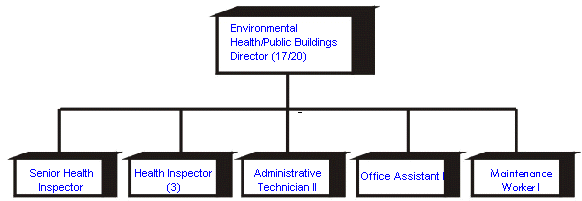 |
Health
______________________________________________________________________________________________________
| Animal Control |
The Environmental Health Department protects the health and safety of the community through education and enforcement of the city's nuisance ordinances and food establishment regulations. One of the primary functions of your Environmental Health Department is enforcement of the State regulations on Retail Food Establishments. Establishments are inspected periodically to promote compliance with the current regulations on food service sanitation. Inspectors also investigate suspected food borne illness complaints and concerns regarding unsanitary conditions. Other ordinances enforced by the department are the City's Junked Vehicle Ordinance, Nuisance Ordinance (i.e., overgrown weedy lots/alleys, illegal dumping, accumulation of junk & debris, accumulation of stagnant water, etc...), and the Livestock and Fowl Ordinance. In addition to these ordinances, staff also investigates and addresses citizen bee call complaints. The department also combats mosquito transmitted diseases by treating standing water to prevent mosquito larvae from hatching into adult mosquitoes and by utilizing the latest mosquito fogging equipment.
|
|
|
|
Primary responsibilities: Food-Borne illness complaints are of great concern. Inspectors investigate all reported food borne illness complaints immediately. Proper measures are taken to insure that all investigations are complete and the outcome is positive for the consumer and food establishment involved. Reports are completed and copies are provided to parties involved. Inspections are conducted at each Retail Food Establishment annually to promote compliance with the adopted State Food Establishment Rules. Health inspectors take the necessary time to educate the owner/managers on the importance of proper food protection and sanitation. Health Inspectors are also responsible for patrolling their respective areas for properties in violation of the City's Nuisance Ordinance twice per month. This ordinance includes overgrown weedy lots, illegal dumping, accumulation of junk & debris and accumulation of stagnant water. A Clean-Up notice is mailed to property owner(s) whose properties are in violation of this ordinance. Property owners are allowed a 10-day grace period in which to comply. Non-compliance results in the City taking corrective action and a statement mailed to property owner indicating date cleaned and costs incurred. A Municipal Lien is filed against the property if balance on statement is not paid within 30 days. Another Ordinance enforced by the department is the Junk Vehicle Ordinance. Owners of vehicles meeting the City’s definition of a “Junk Vehicle” are notified, via a red tag placed on the vehicle and/or a certified letter, of the need to address the violation. Letters are mailed to the property owner where the vehicle is located, and lien holder and the last known registered owner of the vehicle. A ten-day grace period is allowed for compliance. Compliance may be accomplished by proving the vehicle operable, removing it from the city or by having it completely enclosed and out of public view. Failure to comply may result in the City removing and transferring the vehicle to a local demolisher. |
|
|
FOOD BOOTH AND SPECIAL FUNCTION REQUIREMENTS TEXAS DEPARTMENT OF
HEALTH FOOD REGULATIONS AND TEMPORARY FOOD PERMIT REQUIREMENT.... TEMPORARY FOOD PERMIT APPLICATION
Operation Lone Star 2005 La Operacion Estrella Solitaria 2005 A
MESSAGE FROM YOUR For answers to frequently asked questions regarding the mosquito transmitted West Nile Virus, visit the Texas Department of Health website at www.texaswestnile.org. The website provides information and updates on the West Nile Virus in both English and Spanish. Or if preferred, citizens may receive information and updates on the virus, in english and spanish, by calling the Texas Department of Health toll free number at 1-888-883-9997. Recently we have heard and read more and more about the threat of the mosquito transmitted West Nile Virus (WNV). The virus, which may cause encephalitis, was first detected in the United States in 1999 with 62 human cases and 7 deaths in New York. It is being introduced into other states and counties by way of migratory birds. In the past few months we have had a total of 445 confirmed cases of the WNV in Texas including 38 human cases and 1 death. Fortunately we have not had any confirmed human cases of the disease in the Rio Grande Valley. The nearest confirmed case was a bird which tested positive in the Corpus Christi area. Anyone finding a dead bird(s), PARTICULARLY CROWS AND JAYS, should contact the zoonosis division of the Texas Department of Health at (956) 423-0130 or they can contact the Environmental Health Department at (956) 427-8812 Monday thru Friday between the hours of 8:00 & 5:00. It is only a matter of time before the virus is detected here in the Valley. As an additional note; it is important to understand that at this time there is no evidence indicating that the virus can be transmitted from person to person or from physical contact with an infected animal. The following are precautions citizens can take to reduce the likelihood of contracting any mosquito transmitted disease(s):
The Health Department continuously monitors information regarding all mosquito transmitted diseases in order to properly address potential concerns. Most West Nile Virus infected humans have no symptoms of the disease. A small portion develop mild symptoms that include fever, headache, body aches, skin rash and swollen lymph glands. Less than 1% of infected people develop more severe illness that includes meningitis (inflammation of the spinal cord) or encephalitis. The symptoms of these illnesses can include headache, high fever, neck stiffness, stupor, disorientation, coma, tremors, convulsions, muscle weakness and paralysis. Of the few people that develop encephalitis, a small portion die but, overall, this is estimated to occur in less that 1 out of 1000 infections. Should you develop any of the symptoms indicating severe illness, consult with your doctor to determine the nature of the symptoms. Click to see ORDINANCE # 02-48 ON FOOD MANAGERS CERTIFICATION REQUIREMENT
ORDINANCES:
CHAPTER 90:
ANIMALS HEALTH DEPARTMENT ORGANIZATIONAL CHART
The department is staffed by eight (8) employees; three (3) Health Inspectors, one (1) Senior Health Inspector, one (1) Administrative Technician, one (1) Office Assistant, One (1) Maintenance Worker, and the Department Director. |
||
(c) copyright 2006, City of Harlingen

 TEXAS
TEXAS